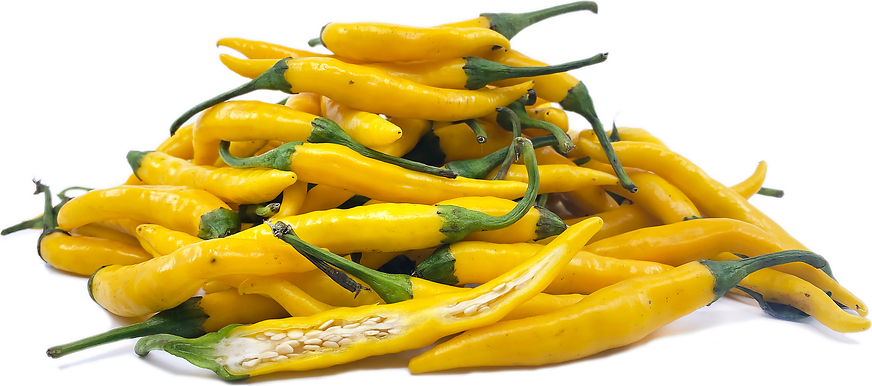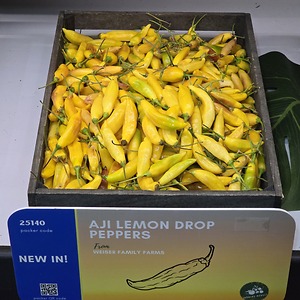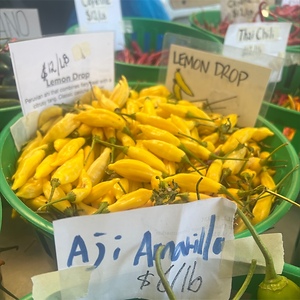


Hot Lemon Peppers
Estimated Inventory, lb : 0
Description/Taste
Hot Lemon chile peppers are straight to slightly curved pods, averaging 8 to 10 centimeters in length, and have a tapered, conical shape. The slender peppers have a firm, slightly wrinkled appearance and change from green to bright yellow with maturity. Underneath the thin skin, the flesh is crisp, pale yellow, and slightly ribbed, encasing a narrow central cavity filled with many small and round, cream-colored seeds. Hot Lemon chile peppers have a subtle, vegetal, and lemon-like fragrance. Both the immature green peppers and mature yellow pods are edible, offering varying spice levels and strength of flavor. When mature, Hot Lemon chile peppers have a fruity flavor with prominent notes of lemongrass and citrus. The peppers are spicy and contain a direct, intense heat with a steady, tingling burn, but over time, the heat dissipates and does not linger.
Seasons/Availability
Hot Lemon chile peppers are available in the summer through fall.
Current Facts
Hot Lemon chile peppers, botanically classified as Capsicum baccatum, are an heirloom variety that belongs to the Solanaceae or nightshade family. The brightly colored peppers are spicy, ranging 15,000 to 30,000 SHU on the Scoville scale, and are known for their steady burn mixed with intense, fruity flavors. Hot Lemon chile peppers are rare and not commercially cultivated. Despite their absence from large retailers, the South American native is increasing in popularity among home gardeners and specialty growers for its unique, subtle citrus aroma, compact size, and high yields. The pods are also favored for their ability to be consumed in both immature and mature forms.
Nutritional Value
Hot Lemon chile peppers are an excellent source of vitamins A and C, which are antioxidants that can help neutralize free radicals and boost the immune system. The peppers also contain capsaicin, which is a chemical compound that triggers the brain to feel the sensation of heat or spice and has been shown to help stimulate the circulatory system and contain anti-inflammatory properties.
Applications
Hot Lemon chile peppers are best suited for fresh applications as their bright, fruity flavor is showcased when chopped and incorporated into savory dishes. The pods can be finely chopped, with the seeds removed, and mixed into salsa, tossed into ceviche, or stirred into soups. The citrus notes in the pepper complement many different seafood dishes and also enhance flavorings in rice, poultry-based dishes, and stir-fries. Beyond fresh applications, Hot Lemon peppers can be pickled for extended use, blended into hot sauce, or dried and ground into a powder for use in dry rubs, or over pasta, pizza, vegetables, and smoked meats. The peppers can also be cooked into a pepper jelly for a sweet-spicy condiment. Hot Lemon chile peppers pair well with herbs such as cilantro, basil, thyme, and parsley, tomatoes, bell peppers, broccoli, meats such as poultry, shrimp, and fish, and coconut milk. The peppers will keep up to one week when loosely stored whole and unwashed in a plastic or paper bag in the refrigerator.
Ethnic/Cultural Info
In the United States, Hot Lemon chile peppers are considered to be uncommon and are frequently cultivated by home gardeners as an exotic variety. The self-professed “chile heads,” or chile pepper collectors, favor the bright yellow pods for their fruity, citrus-like flavor, and strong, but not overpowering heat. In home kitchens, the peppers are primarily incorporated into hot sauces and are used to brighten fish, poultry, or Asian inspired cuisine, especially Thai dishes. Hot Lemon chile peppers are also dried and ground into a powder for extended use. The powder adds additional flavoring, and chile lovers even report using the powder on fruit, coated on candy, or sprinkled over popcorn.
Geography/History
Hot Lemon chile peppers originated in South America and are have been grown in regions of Ecuador and Peru since ancient times. The variety remained primarily localized to South America for many years, but as the consumer demand for exotic chiles increased in the United States and Europe, seed companies such as Burpee began selling the yellow pepper seeds. Today Hot Lemon chile peppers are not commercially cultivated and are grown through select farms for sale at specialty grocers and farmer’s markets. The variety is also available in seed form through online seed retailers in the United States and Europe.









